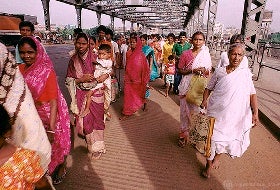 Friday, March 15 is the deadline to join the World Bank in a call against gender-based violence. Participate in a text message contest for South Asian youth (18-25) – we want to hear your best ideas in response to the question, “What Will It Take to End Gender-Based Violence in South Asia?”
Friday, March 15 is the deadline to join the World Bank in a call against gender-based violence. Participate in a text message contest for South Asian youth (18-25) – we want to hear your best ideas in response to the question, “What Will It Take to End Gender-Based Violence in South Asia?”
Get details of the competition here.
I grew up in Delhi, and it has always been unsafe for women and girls. In recent years I lived in Washington, D.C, which was a different world altogether. It was a welcome relief to travel on public transport without having men constantly staring at your body.
Then in December, just before I was to move back to Delhi, I heard about the brutal gang rape in my hometown. I felt outrage and deep anguish watching the news unfold the horrific story leading to the painful death of the victim.
My memory goes back to walking home from the bus stop in the afternoons in my school uniform. Often, men would whiz past on their cycles or two-wheelers and reach out to squeeze my chest or posterior. This happened so often that my girlfriends and I would rush into the gates of the nearest house the moment we heard a vehicle approaching.
One such incident, etched in my mind, was when I was returning from school one afternoon. As I neared the gate of my house, a middle-aged man on a two-wheeler, standing in the alleyway, called out to me, asking me for directions to the local temple. Being wary of strangers, I said I did not know. However, he called out again and said, “Excuse me madam, just one minute, look here,” and I looked back to see him unzipping his fly to flash me. Traumatized, I ran into my home, and told my emancipated mother who immediately rushed out to catch the guy. He had driven off and I remember my mother taking me in the car to look for him and report him. We could not find him.
As I grew older, we heard of such incidents once in a while, especially with girls using public transport, but since I had a car, I felt rather detached from them. I went out often with friends, driving home alone late at night. Call it the arrogance of youth, but I was quite fearless 10 or 15 years ago.
Returning to Delhi makes me realize that though the city may have changed in terms of modernization, many things remain the same old, same old. But I have changed, the careless attitude replaced by a more vigilant and practical me. No late-night movies with girlfriends, no driving alone at night – we do not want to tempt fate. I would not even go to Noida or Gurgaon, which are suburbs of Delhi, alone at night. Even at home, nothing provocative is worn, talked about, or played on TV in front of male domestic staff.
Many gruesome incidents have been appearing on the news, which calls Delhi “the rape capital of the world.” While these incidents happened earlier as well, they were not reported as much. Today we are getting reports on rapes every two hours in cities like Delhi and elsewhere, thus recording an unprecedented growth in rape cases across India. Sometimes I feel that this is a positive step toward better enforcement, but at times I feel the media reports are almost like sustenance to these vile creatures who do this to women and girls and seem to thrive on the publicity.
My sentiments, shared by many of my fellow countrywomen, are that we need stringent laws, fast-track courts for justice, and the severest punishment for offenders. But still we ask, “When will it stop?”


Join the Conversation